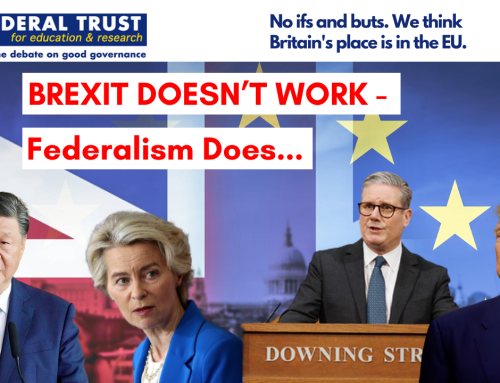The Austrian Presidency could derail the EU’s plans ahead of the 2019 changeover
by David Gow, Former German Correspondent, Industrial Editor and European Business Editor, The Guardian
3rd April 2018
This article was first published by Acumen Public Affairs.
Austria takes over the EU presidency on July 1, and its six-month tenure is already making waves. Partly, this has to do with the fact that this will be the last full presidency before the EU change-over begins with the European Parliament elections between May 23 and 26 next year and a new Commission in the autumn.
There are around 60 priority pending proposals in the Commission’s 2018 work programme to be settled by Council and Parliament but Vienna thereby has three key issues to clear pretty well before Romania takes over on January 1 2019. These are Brexit and the transition to and after it, the EU budget post-2020 following the exit in late March of the UK or the second largest net contributor, and “reform” (of the Eurozone but also of EU institutions).
A “Union that empowers and protects”
As if these were not tough enough nuts to crack, Sebastian Kurz, the youthful Austrian chancellor, has chosen one other issue – security, not reform – and an approach to it that threatens to be even more divisive than these for the EU-27.
Kurz, a Christian Democrat who governs in coalition with the Far Right FPÖ or Freedom Party once led by the notorious Jörg Haider, has made internal and external security the priority of the Austrian presidency. During talks with Donald Tusk, European Council president, on February 13 he said: “We would like to make security and the fight against illegal immigration a priority of our EU presidency.” He has talked of a “Union that empowers and protects its citizens” in the “fight against radicalisation and violent extremism.” For him, the European agenda on security and the one on migration are indivisible.
Kurz is putting his weight behind a campaign to end the quota system for handling migrants and, instead, expel them back to their region of origin or never allow them to enter in the first place – on the grounds of internal security. “Protection (of borders) alone will not solve the migration question but the decisive question is what happens to people after their rescue – are they brought to central Europe or are they taken back to the countries of origin or other safe regions where they can be provided for?” Kurz has said.
The Austrian chancellor took sharp issue with his German counterpart, Angela Merkel, at the March EU summit. When she suggested using the cohesion fund (part of the EU budget) to integrate migrants into their host country, he retorted that the key issue was to bolster external borders. The stark fault-lines between the centre right and the far right and, more pertinently, within the centre right on this crucial migration issue suggest that it (and the eight associated Commission proposals) will not be settled any time soon.
Here Kurz is a bridge-builder, above all, to the Visegrad 4 EU members – Poland, Hungary, the Czech Republic, Slovakia – and, particularly, to the first two which are the ones most at odds with Brussels. These two eastern European member states are most determined to renationalise EU competences and, like Slovakia, re-energise “subsidiarity”. It’s a tone close to the Austrian chancellor’s talk of “streamlining the EU”: making the post-Brexit EU budget, which will lose €15bn in UK contributions, smaller and more effective, for example, as part of generalised moves to cut the Commission “down to size.”
Indeed, many of his positions on the migration issue are close to those of Viktor Orban who, with his Fidesz party in Hungary, is seeking re-election for a third successive time on April 8. Just as Kurz moved much closer to his Far Right coalition partners during the election campaign that brought him to power, so Orban has adopted many of the anti-migrant, Islamophobic positions once promoted by the right-wing extremists of Jobbik, the biggest opposition party. So far, Fidesz has been riding high in the polls.
Hungary and others place great store by the prospects for an equally anti-migrant, pro-nationalist government to emerge in Italy after the March 8 elections saw the parties espousing such views, mainly Five Stars and the Lega, holding over 50% of the vote. But, while Austria’s presidency will undoubtedly create greater pressure for a decisive shift to the right in EU policy-making, it is far from given that this is unstoppable.
What this means for the pre-changeover legislative push and for bigger-picture EU reform
The traditional main drivers of EU integration and power-brokers inside the EU nexus, France and Germany, remain governed by centrist parties that have little truck with this. While Kurz can present himself as the image of a more youthful, modern Europe where the nation state regains controls and competences – as a rival to Emmanuel Macron and in contrast to the less fresh German leadership under Merkel – he does not have enough allies to execute radical change in the EU’s modus operandi.
Nonetheless, taking advantage of the perks of the Council Presidency, Kurz and his government could still do plenty to disrupt the EU status quo. With the changeover coming up in 2019, the second half of 2018 will be key for pushing through remaining legislative files. But under a Presidency that wants to “streamline” the EU’s work these efforts could be frustrated.
As the Union contemplates life post-Brexit, its unity vis-à-vis the UK is holding up so far but there are deepening fissures beneath the surface. Mark Rutte, the re-energised Dutch Liberal premier, is leading a posse of neo-liberals, including the Baltics, dead-set against any enhanced role for the EU: “the recipe for a larger cake is not centralised bail-out funds and printing more money but structural reforms and sound budgets” (recent Berlin speech). And it’s clear that the talk of a revitalised Franco-German tandem is far too glib. Can it really break the legislative logjam that’s likely to get worse as Brexit and the European Parliament elections approach?
The onus is indeed on them to settle their significant differences on issues such as reforming the Eurozone to make it more shock-proof and, dare one say it, less wedded to austerity. Economic security is a huge concern for Europe’s citizens – and a greater sense of it would both undercut the Far Right and buttress confidence and trust in the Union as a whole. But amid all the competing ideas for “making Europe work for its citizens” there’s no clear evidence yet that the EU-27 can deliver as one.






